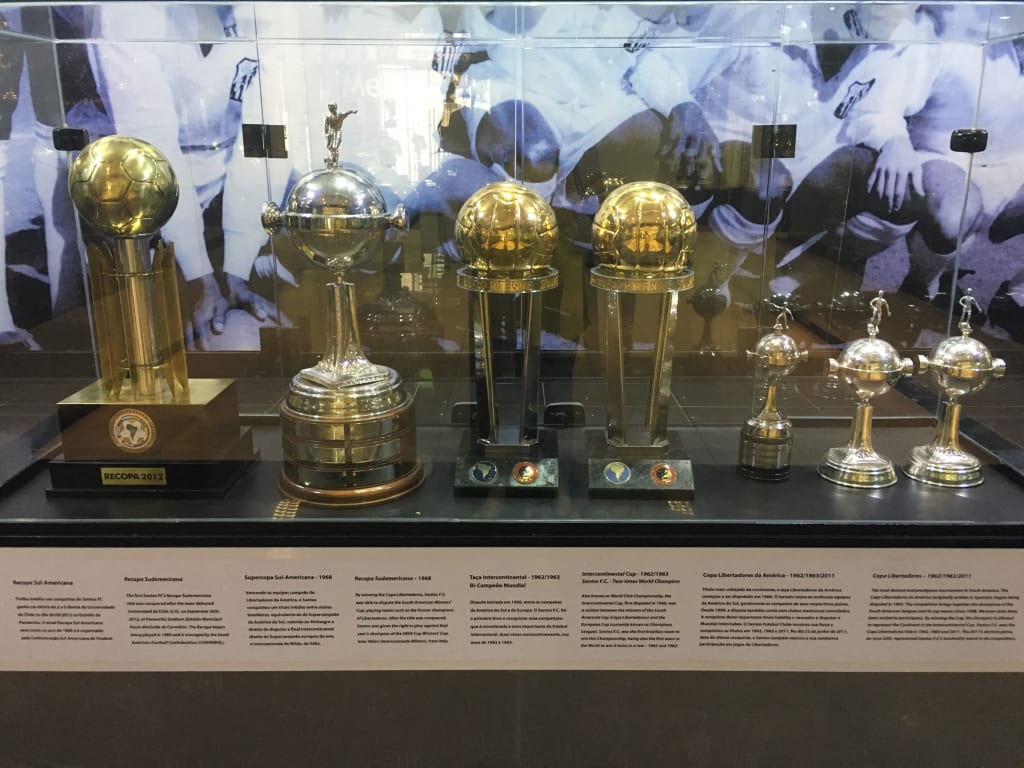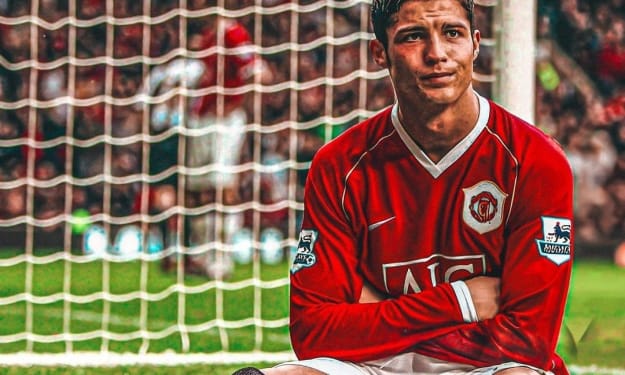What the Century-Long Success of the Football “Village Boys” Can Teach You
How to nourish talents, turn weaknesses into strengths and develop loyalty.

How, against all odds, a middle-sized port-town generated continuous world-class talents during the last century?
How their local team can compete with the giants from the capital, a city with nearly thirty times more residents and stadiums three to five times larger?
How the merciless economical rules that polarize companies, markets, and sports all over the world (Apple vs Samsung, Real Madrid vs Barcelona, Pepsi vs Coca-Cola) did not vanish this club from earth?
This is more than an example of David vs Goliath. This is David vs 3 different Goliaths while also fighting debts, contusions, and a crowd cheering against him. This is Santos FC, and here are their secrets to fight and win against giants, to the point that they became giants themselves. A blueprint for any organization or business battling against fierce competition.
Discover something you can do it well and become excellent at it.
Football, like most other activities, does not have a single way to triumph. It has multiple paths, all of them with traps and perks in their roads to victory, or failure.
One can be successful playing with the defensive school typical of Italian football. Others achieve victory by adopting the coordinated and aerial game of the Germans, while the frenetic passing from Guardiola’s Tiki-Taka brought glory to Barcelona.
Since the early years, Santos discovered that the root of their success was attacking. Coaches like Lula, a legendary trainer from the 60s sharpened the super-offensive style, which at the beginning could be raucous and amateur. This was a natural step, considering that Santos is a port town, with irregular fields and an always-moving population. There was no time to teach complex tactics to junior players that soon could move out. So instead they stimulated dribbling abilities and finishing skills.
During tough times over the last century, Santos tried few times to adopt defensive styles but always reverted to their characteristic enraged attacking beat. Nearly every important conquest came by scoring (and conceding) multiple goals.
This shaped a remarkable achievement: even though Santos FC is much younger than traditional English or Scottish teams, it has scored more goals than any other club on the planet.
How to apply that to your business: The Craftsman Mindset, employed by Santos in the football fields and conceptualized by Cal Newport, is also the reason for the success of companies like Whole Foods or Ryanair. They discovered something that they were good at, and focused on it — respectively, catering to health-conscious clients and reducing costs.
Talent Acquisition Formula
While the Craftsman Mindset explains how Santos secured their attacking soul to thrive on the football field, there is still the mystery of how the team found talented legs to put the offensive spirit to work.
At first, that was a problem. Santos couldn’t rely only on the local talents of a middle-sized port-city. So from the very early ages, they created a capillary network of academies, football schools, and scouting associates. Nowadays, they have 92 academics or franchises, in places as diverse as South Korea, Paraguay, or the United States.
They bring to their training centers talents from remote parts of Brazil, and they do it at an early age. To know how far Santos goes to recruit players, it is enough to look to the birthplaces of their current line-up. The Goalkeepers, the wingers, and attackers are all from cities farther than 1000km, and all arrived at Santos still as juniors.
A line-up of young players resulted in the club’s nickname: Os Meninos da Vila (The Village Boys), regarding the popular name of their stadium, Vila Belmiro.
How to apply that to your business: A successful enterprise needs a sustainable talent acquisition system, especially during moments of expansion. Forbes Human Resources Council considers it one of the most common HR bottlenecks. When a company opens a hiring process in new areas or segments, they increase the chances of fulfilling their positions with qualified people.
Understand your weaknesses to build your strengths
There is a reason that Santos relies on a network of scouts and talents to bring promising stars. It is because it is the only way possible.
Having a more modest fan-base, Santos does not have the resources of their neighboring rivals São Paulo and Corinthians, with respectively 2.5X and 4.5X more supporters. They often could not purchase stars from other clubs.
The smaller size (of the city, not of the trophy room) was an obstacle to survival at the highest competitive level of the sport. Among the 10 most successful clubs in the country, there is not a single one coming from a city with less than 1 million people, except Santos, coming from a place with less than 500K.
To keep the stream of young stars, there is an internal informal law at Santos. It advises that 10% of the club’s revenues must go to their youth structure, to protect their production line. By selling lead players, Santos built state-of-art training centers and accommodation for hundreds of U20 boys.
The club has an unusual alternative to remote recruitment. They ask for promising youngsters to send YouTube videos displaying their abilities, and invites the best of them to join their academy.
It pays off during a crisis. In 2003, the club's economic situation was desperate, so the directors decided to not buy any player to reinforce the squad. Instead, they promoted dozens of their U20 team. It worked, and with wonder kids like Elano, Alex, Robinho, and Diego, they won the national league.
Santos FC knows that revealing and selling players is the only alternative they have. In a smaller city, with a much smaller stadium and competing with three rivals from one of the world’s largest cities, stirring and exporting talents is what makes them competitive.
There is another example of how Santos turned a weakness into a strength. Their 17,923-seat stadium is tiny compared to the rivals Corinthians and Palmeiras, both boasting arenas with over 40 thousand seats, not even mentioning São Paulo and their Morumbi, a 72 039-seat giant.
But none of them intimidate adversaries as much as the Vila Belmiro. Santos built it with the seats hunching over the playing field, and the passionate supporters are only a few meters away from their team — or the rival players.
How to apply that to your business: We all know that smaller size sometimes plays against firms. A small business does not have the same bargain power with suppliers or cheap credit lines as large corporations. On the other hand, a reduced size increases the innovation speed. It also reduces bureaucracy and speed process improvements. When a company is smaller and acts on a specialized niche, it is also easier to make alliances with non-conflicting partners. Use that in your favor.
Mentoring and the power of example
Santos found a profitable way to exist by attracting talents, using them in the field as much as possible, and then selling to European clubs.
But no matter how wide is their scouting and academy structure or how good is their training center, it would not work if they didn’t keep mentors to guide the youngsters.
Pelé, Santos’s brightest player, raised sitting on the shoulders of Lula, the team’s greatest coach. Besides the sideline trainers, the club makes use of their alumni, former players that still collaborate with the club and act as consultants to help the practice and development of the next generations.
More than practical advice, this formula resides on the power of example.
A Brazilian journalist described for a Santos FC documentary:
Many of the scouts are former players, thus they have a better understanding of what is needed for a player to succeed.
Dozens, hundreds of ambitious young boys can turn a place into a powder keg — as shown by the fact-based Netflix series The English Game. There is also the added problem of European scouts luring players as young as 16 years old. By having former stars close, Santos uses their good example to shape the next generations and makes them loyal to the club, at least until a good transfer deal appears.
Levi Borba is CEO of expatriateconsultancy.com, creator of the channel Small Business Hacks, and a best-selling author. You can check his books here, his other articles here, or his Linkedin here.
About the Creator
Borba de Souza
Writer and business founder that enjoys writing about history and culture.
Founder of Small Business Hacks https://www.youtube.com/c/SmallBusinessHacks and https://expatriateconsultancy.com. My published books: https://amzn.to/3tyxDe0






Comments
There are no comments for this story
Be the first to respond and start the conversation.